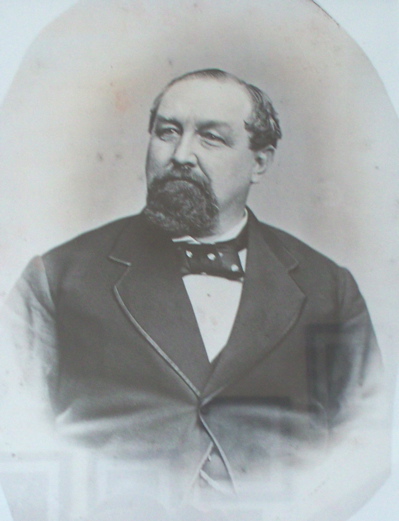Encyclopedia Dubuque
"Encyclopedia Dubuque is the online authority for all things Dubuque, written by the people who know the city best.”
Marshall Cohen—researcher and producer, CNN
Affiliated with the Local History Network of the State Historical Society of Iowa, and the Iowa Museum Association.
WILSON, David S.: Difference between revisions
No edit summary |
No edit summary |
||
| Line 4: | Line 4: | ||
streets. | streets. | ||
Wilson was elected to a term of four years in the Iowa Senate. At this time, Wilson was nominated by his fellow legislators to deliver a lecture on "The Right of States to Secede from the Union." The lecture, considered the first of its kind, showed such depth of research that it was adopted as the war document of the state. The legislature printed and distributed thousands of copies. | |||
When the [[CIVIL WAR]] began, Wilson led the “War Democrats” and spoke against secession. In 1862 he was commissioned colonel of the Sixth Cavalry which campaigned against the Sioux Indians involved in the Minnesota massacre. | When the [[CIVIL WAR]] began, Wilson led the “War Democrats” and spoke against secession. In 1862 he was commissioned colonel of the Sixth Cavalry which campaigned against the Sioux Indians involved in the Minnesota massacre. | ||
Revision as of 02:25, 31 May 2012
WILSON, David S. (Steubenville, OH, Mar. 18, 1825-Dubuque, IA, Apr. 1, 1881). MAYOR. Wilson, the brother of Thomas S. WILSON, bought into the ownership of the Miners' Express in 1841. He remained the newspaper's editor until 1845 when he sold his interest and resumed his study of law. Elected to the Iowa House in 1846, Wilson took an active role in re-submitting Iowa's constitution to the people. During the Mexican War he shared responsibility for moving the entire tribe of Winnebago from their reservation at Fort Atkinson into Minnesota.
Returning to Dubuque, Wilson served as mayor in 1856. During his first term along Main street cisterns holding 1,000 barrels each were built for fire protection. A private house was converted into a calaboose in April, 1856. In the fall of 1856 gas lighting was extended to the leading side streets.
Wilson was elected to a term of four years in the Iowa Senate. At this time, Wilson was nominated by his fellow legislators to deliver a lecture on "The Right of States to Secede from the Union." The lecture, considered the first of its kind, showed such depth of research that it was adopted as the war document of the state. The legislature printed and distributed thousands of copies.
When the CIVIL WAR began, Wilson led the “War Democrats” and spoke against secession. In 1862 he was commissioned colonel of the Sixth Cavalry which campaigned against the Sioux Indians involved in the Minnesota massacre.
In 1864 Colonel Wilson resigned his command, returned to Dubuque, and resumed his practice of law. In 1872 he was appointed circuit judge and soon after district judge. He served until 1878.


